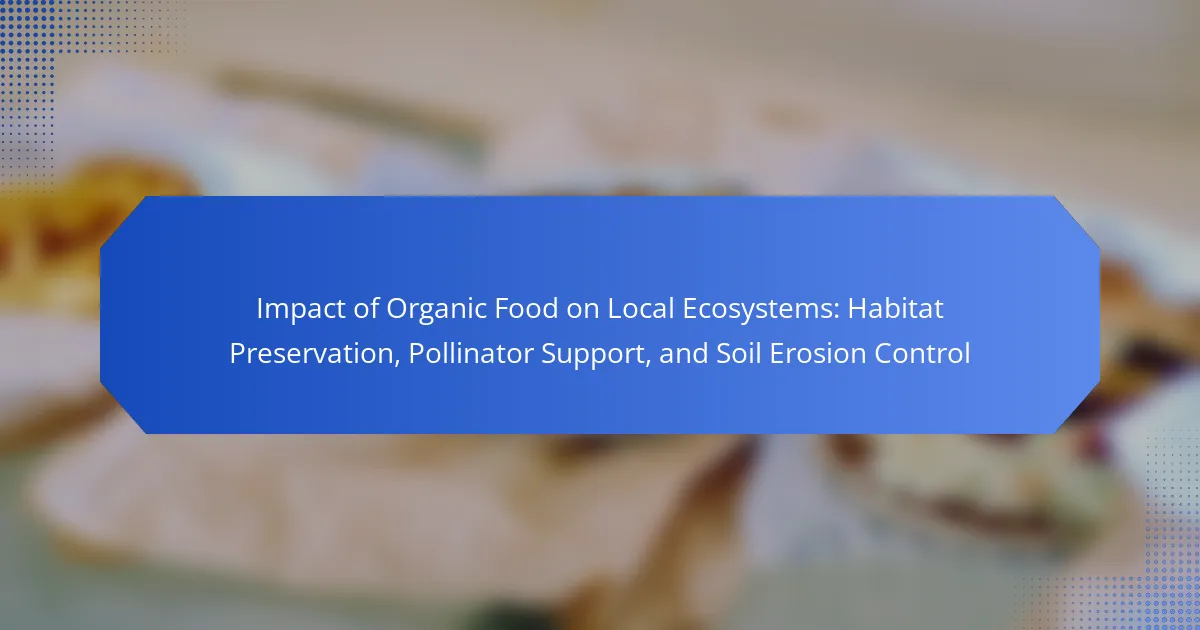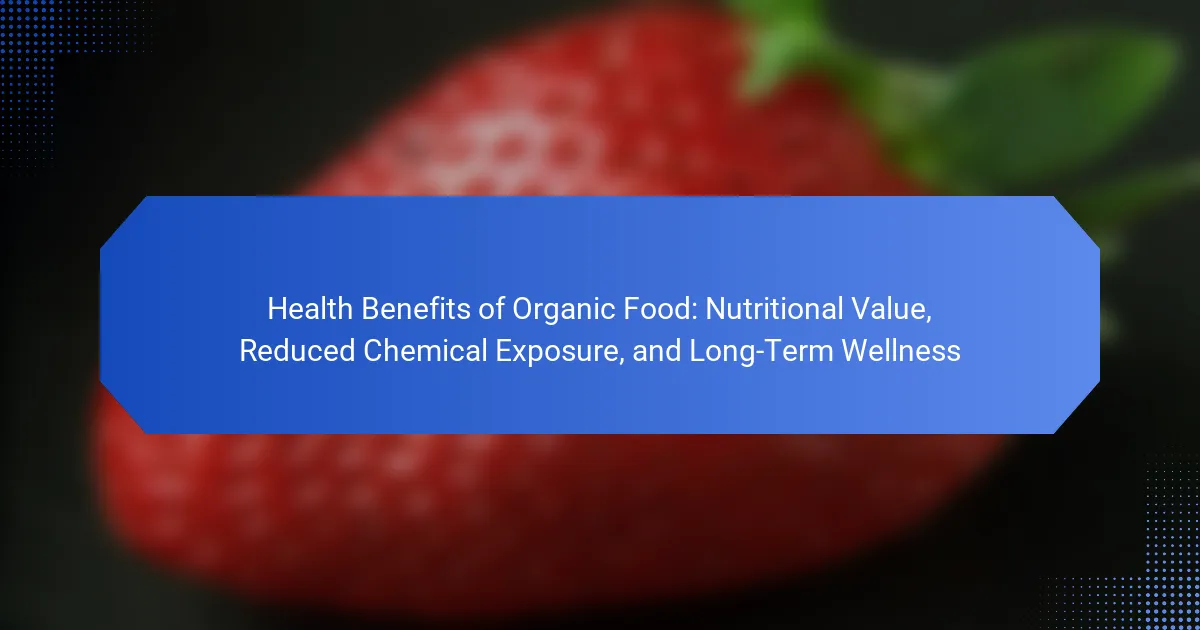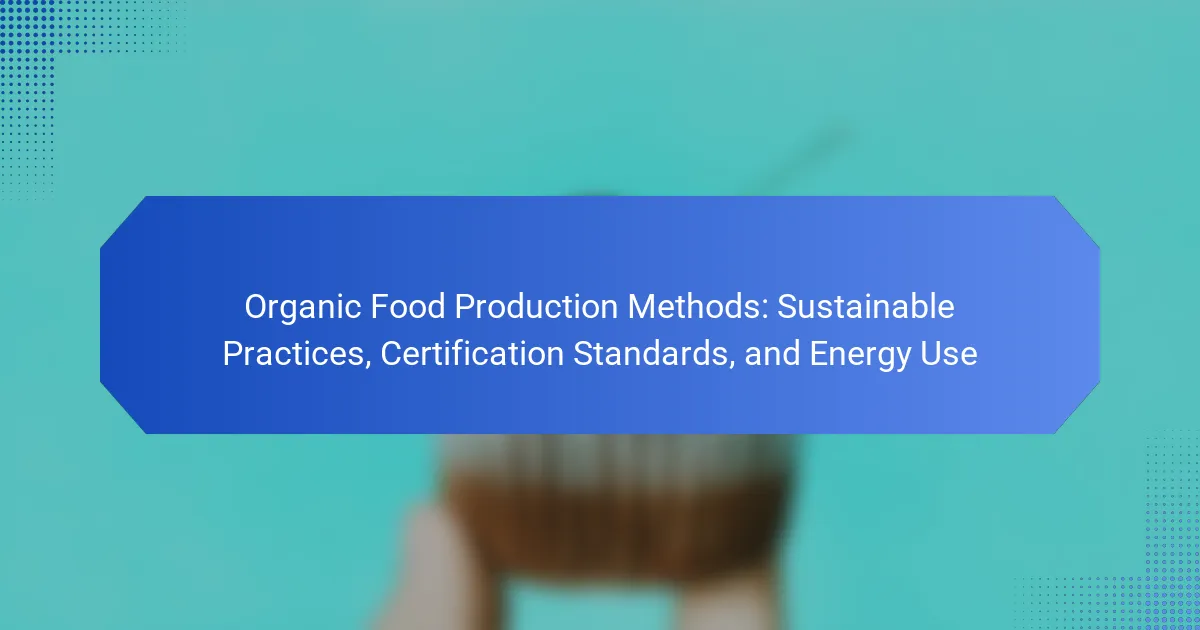Organic food is integral to sustainable agriculture, emphasizing practices that enhance soil health and promote biodiversity. Key methods such as crop rotation, cover cropping, and composting significantly improve soil fertility while minimizing reliance on synthetic pesticides. Despite the benefits, organic farmers encounter challenges like pest management, market access, and the economic impact of transitioning to organic practices. Research indicates that organic farming systems can yield comparable results to conventional methods and contribute positively to climate change mitigation through increased soil carbon levels. This article explores the critical role of organic food in sustainable agriculture, focusing on the interconnected aspects of crop rotation, pest management, and soil fertility.
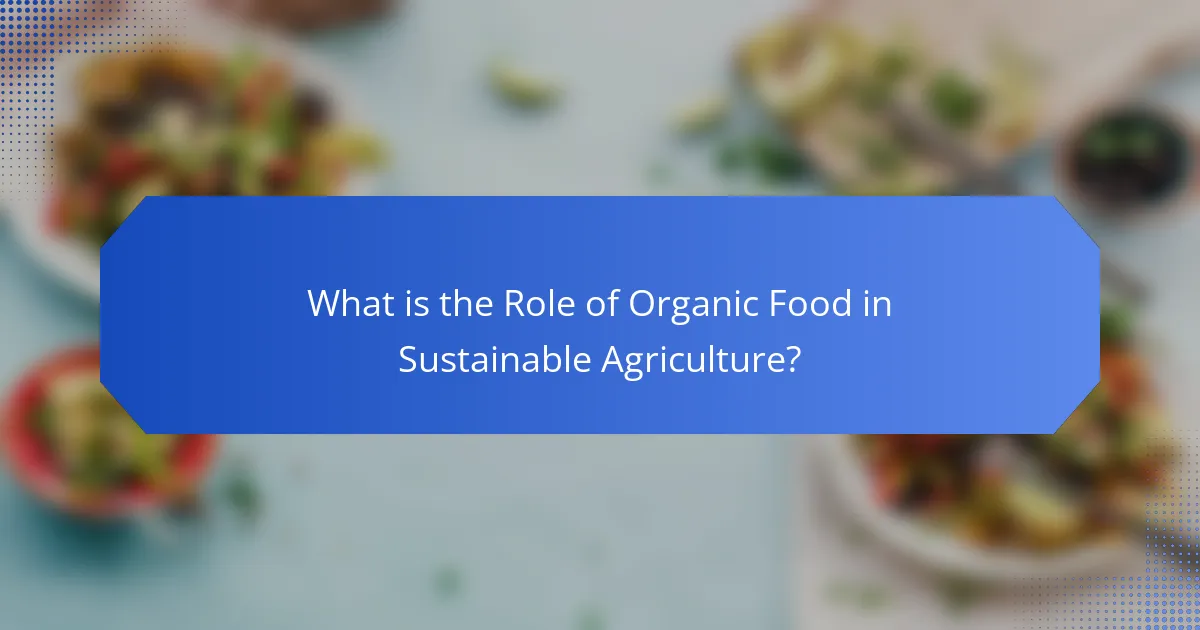
What is the Role of Organic Food in Sustainable Agriculture?
Organic food plays a crucial role in sustainable agriculture. It promotes biodiversity and enhances soil health. Organic practices, such as crop rotation, reduce soil erosion. These methods increase soil fertility by using natural fertilizers. Organic farming also limits the use of synthetic pesticides. This practice encourages natural pest management strategies. Research shows that organic systems yield comparable results to conventional methods. A study by the Rodale Institute found that organic farming can increase soil carbon levels. This contributes to climate change mitigation. Overall, organic food supports sustainable agricultural practices.
How does organic food contribute to sustainable farming practices?
Organic food contributes to sustainable farming practices by promoting biodiversity and reducing chemical inputs. Organic farming methods prioritize crop rotation, which enhances soil health and reduces pest populations. This practice helps maintain ecosystem balance and prevents soil degradation. Additionally, organic farming avoids synthetic pesticides and fertilizers, leading to healthier soil microbiomes. Studies indicate that organic farms often have higher levels of soil organic matter, which improves water retention and nutrient availability. Furthermore, organic practices support local ecosystems, encouraging beneficial insects and pollinators. This holistic approach ultimately leads to more resilient agricultural systems.
What are the key principles of organic farming?
The key principles of organic farming include promoting biodiversity, enhancing soil health, and using natural pest management. Biodiversity supports ecosystem resilience and reduces disease susceptibility. Healthy soil is achieved through practices like crop rotation and cover cropping. Natural pest management relies on biological controls and plant diversity to minimize chemical inputs. Organic farming also emphasizes the use of organic fertilizers and compost to nourish plants. These practices contribute to sustainable agriculture by maintaining ecological balance and reducing environmental impact.
How does organic food impact environmental health?
Organic food positively impacts environmental health by promoting biodiversity and reducing pollution. Organic farming practices avoid synthetic pesticides and fertilizers. This leads to healthier soil and water systems. Studies show organic farms support more wildlife and beneficial insects. For instance, a study published in “Nature” found that organic farms can have up to 50% more biodiversity than conventional farms. Additionally, organic practices improve soil health, which enhances carbon sequestration. Healthier soils can retain more water, reducing runoff and erosion. Overall, organic food contributes to a more sustainable agricultural system and a healthier environment.
Why is crop rotation important in organic agriculture?
Crop rotation is important in organic agriculture because it enhances soil health and reduces pest and disease cycles. By alternating different crops, organic farmers can improve nutrient availability in the soil. This practice helps prevent nutrient depletion associated with growing the same crop repeatedly. Crop rotation also disrupts the life cycles of pests and diseases, leading to lower infestations. Studies show that diverse cropping systems can yield better results than monocultures. Additionally, rotating crops can increase biodiversity, which is crucial for a resilient ecosystem. Overall, crop rotation contributes significantly to sustainable farming practices in organic agriculture.
What are the benefits of crop rotation for soil health?
Crop rotation significantly enhances soil health. It improves soil structure and fertility. Different crops contribute unique nutrients to the soil. For example, legumes fix nitrogen, enriching the soil for subsequent crops. Crop rotation also disrupts pest and disease cycles. This practice reduces reliance on chemical pesticides. Studies show that rotating crops can increase organic matter in the soil. Enhanced organic matter promotes better water retention and microbial activity. Overall, crop rotation leads to more resilient and productive soils.
How does crop rotation help in pest management?
Crop rotation helps in pest management by disrupting the life cycles of pests. Different crops attract different pests. When farmers rotate crops, they reduce the chances of pests establishing a population. For example, planting legumes one year and grains the next can deter pests that prefer one type of plant. This practice can also enhance the presence of beneficial insects that prey on harmful pests. Studies have shown that crop rotation can lower pest populations significantly. A study by the University of Illinois found that rotating corn and soybeans reduced pest pressure by 20-30%. This method not only aids in pest control but also promotes healthier soil.
How does organic pest management differ from conventional methods?
Organic pest management relies on natural methods and materials, while conventional methods often use synthetic chemicals. Organic practices include biological control, habitat manipulation, and cultural practices. These methods promote ecosystem balance and reduce chemical residues in food. Conventional pest management frequently involves pesticides that can harm beneficial organisms and lead to resistance. Studies indicate that organic methods can be equally effective in controlling pests without adverse environmental impacts. Research shows that organic farms often have higher biodiversity, which contributes to pest control. This difference underscores the sustainability of organic agriculture compared to conventional approaches.
What techniques are used in organic pest management?
Organic pest management employs techniques such as crop rotation, biological control, and the use of natural pesticides. Crop rotation disrupts pest life cycles by alternating different crops in the same area. Biological control involves introducing natural predators or parasites to manage pest populations. Natural pesticides, derived from plants or minerals, provide an eco-friendly alternative to synthetic chemicals. These methods aim to reduce pest damage while maintaining ecological balance. Research shows that integrated pest management strategies, which combine these techniques, can effectively control pests while promoting sustainability in agriculture.
How effective are organic pest management strategies?
Organic pest management strategies are effective in controlling pests while minimizing harm to the environment. These strategies include biological control, cultural practices, and the use of organic pesticides. Research shows that organic methods can reduce pest populations by up to 50% compared to conventional methods. A study published in the journal “Agriculture, Ecosystems & Environment” found that organic farms had higher biodiversity, which supports natural pest control. Additionally, organic pest management practices enhance soil health, leading to better crop resilience. Overall, organic pest management is a viable approach for sustainable agriculture.
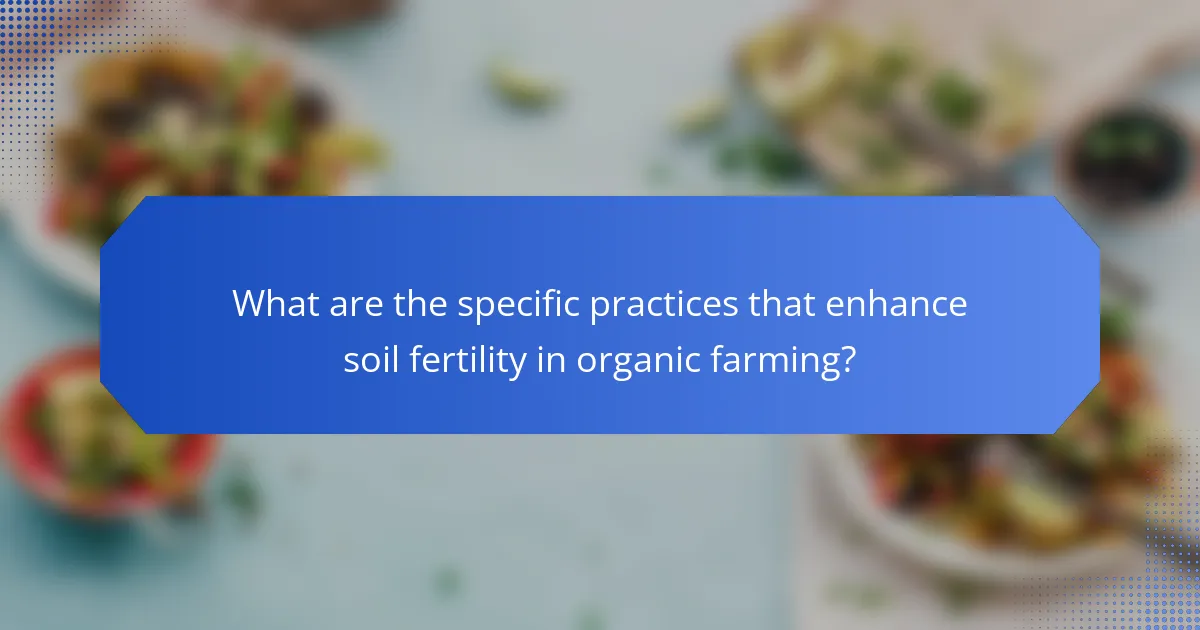
What are the specific practices that enhance soil fertility in organic farming?
Specific practices that enhance soil fertility in organic farming include crop rotation, cover cropping, and composting. Crop rotation helps prevent nutrient depletion by alternating different crops. This practice encourages diverse root structures and improves soil structure. Cover cropping involves planting crops that are not harvested, which adds organic matter to the soil. These plants also help prevent erosion and suppress weeds. Composting enriches soil by adding decomposed organic material. This process enhances microbial activity and improves nutrient availability. Additionally, using natural fertilizers like manure and green manures contributes essential nutrients. These practices collectively promote a healthy soil ecosystem, which is crucial for sustainable agriculture.
How do cover crops contribute to soil fertility?
Cover crops enhance soil fertility by improving soil structure and increasing nutrient availability. They add organic matter to the soil as they decompose. This organic matter improves soil aeration and water retention. Additionally, certain cover crops, like legumes, fix atmospheric nitrogen. This process enriches the soil with nitrogen, a vital nutrient for plants. Research indicates that cover crops can reduce soil erosion by protecting the soil surface. They also suppress weeds, which can compete for nutrients. Overall, cover crops play a crucial role in sustainable agricultural practices by maintaining and enhancing soil fertility.
What types of cover crops are most beneficial?
Leguminous cover crops are among the most beneficial types. They fix nitrogen in the soil, improving fertility. Common examples include clover and vetch. Grasses, such as rye and oats, also provide significant benefits. They enhance soil structure and prevent erosion. Brassicas, like mustard, suppress weeds and pests. These crops contribute organic matter, enriching the soil. Research shows that diverse cover cropping systems yield better overall soil health.
How do cover crops influence nutrient cycling?
Cover crops enhance nutrient cycling by improving soil health and increasing organic matter. They contribute to nitrogen fixation, which enriches soil fertility. Leguminous cover crops, such as clover, can add significant nitrogen to the soil. This process reduces the need for synthetic fertilizers. Additionally, cover crops prevent soil erosion and leaching of nutrients. They also promote microbial activity, which aids in nutrient breakdown and availability. Research indicates that cover crops can increase soil organic carbon levels by 0.1 to 0.6% annually. This improves nutrient retention and cycling efficiency in agricultural systems.
What role do compost and organic fertilizers play in soil health?
Compost and organic fertilizers enhance soil health by improving its structure and nutrient content. They increase the organic matter in the soil, which promotes microbial activity. This microbial activity is essential for nutrient cycling. Healthy soil supports plant growth by providing essential nutrients like nitrogen, phosphorus, and potassium. Additionally, compost and organic fertilizers improve soil moisture retention. This leads to better drought resistance in plants. Studies show that soils enriched with compost exhibit higher fertility levels. Research indicates that organic amendments can increase crop yields significantly.
How can compost improve soil structure and fertility?
Compost improves soil structure and fertility by enhancing nutrient content and moisture retention. It introduces organic matter, which increases soil aeration and drainage. This process promotes the growth of beneficial microorganisms. These microorganisms further break down nutrients, making them available for plant uptake. Compost also helps to bind soil particles together, creating a crumbly texture. This texture reduces erosion and compaction. Studies show that compost can increase plant yield by up to 30%. Additionally, compost enriches the soil with essential nutrients like nitrogen, phosphorus, and potassium.
What are the differences between organic fertilizers and synthetic fertilizers?
Organic fertilizers are derived from natural sources, while synthetic fertilizers are chemically manufactured. Organic fertilizers include compost, manure, and bone meal. They improve soil structure and promote beneficial microbial activity. Synthetic fertilizers provide nutrients in a concentrated form for quick plant uptake. They often lead to soil acidification and nutrient runoff. Organic fertilizers release nutrients slowly, reducing the risk of over-fertilization. Synthetic fertilizers can cause nutrient leaching, impacting water quality. Research indicates that organic fertilizers enhance long-term soil health and sustainability.
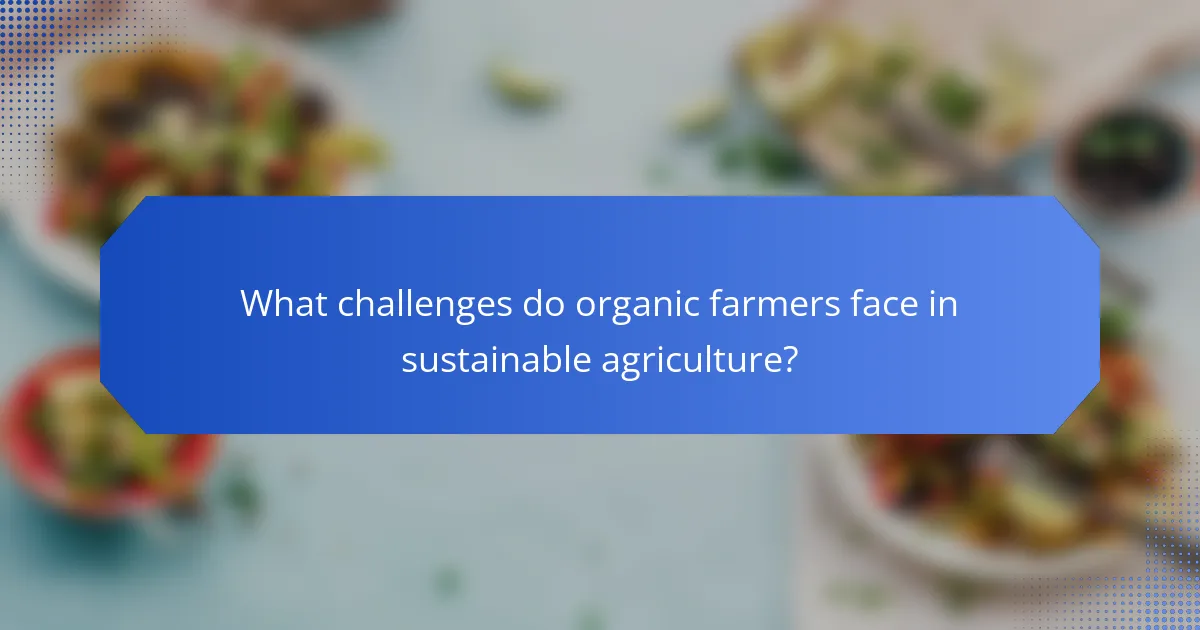
What challenges do organic farmers face in sustainable agriculture?
Organic farmers face several challenges in sustainable agriculture. These include pest management, which is more difficult without synthetic pesticides. Crop rotation can lead to reduced yields due to soil nutrient depletion. The transition to organic farming often results in a temporary decrease in income. Organic certification processes can be time-consuming and costly. Weather variability impacts organic crops significantly, affecting overall productivity. Additionally, organic farmers may struggle with market access and competition from conventional farms. These challenges can hinder the growth and sustainability of organic farming practices.
How can organic farmers overcome pest and disease challenges?
Organic farmers can overcome pest and disease challenges by implementing integrated pest management (IPM) strategies. These strategies include crop rotation, which disrupts pest life cycles. Additionally, organic farmers utilize beneficial insects to control pest populations naturally. They also apply organic-approved pesticides when necessary, ensuring minimal environmental impact. Soil health is enhanced through composting and cover cropping, which strengthens plant resilience against diseases. Regular monitoring of crops helps in early detection of pest and disease issues. Research indicates that these practices can significantly reduce the reliance on synthetic chemicals. Studies show that organic farming can result in lower pest incidence compared to conventional methods.
What strategies can be implemented to manage these challenges effectively?
Implementing integrated pest management (IPM) is a key strategy to manage challenges in sustainable agriculture. IPM combines biological, cultural, physical, and chemical tools to minimize pest damage. Crop rotation is another effective strategy, as it disrupts pest life cycles and improves soil health. Utilizing cover crops enhances soil fertility and suppresses weeds, contributing to sustainable practices. Additionally, organic fertilizers can improve soil nutrient levels without harming the environment. Research shows that these methods can lead to higher yields while maintaining ecological balance. For example, a study by the Rodale Institute found that organic systems can yield as much as conventional systems over time while improving soil health.
What are best practices for implementing organic farming techniques?
Best practices for implementing organic farming techniques include using crop rotation, maintaining soil health, and managing pests naturally. Crop rotation helps improve soil fertility and disrupts pest cycles. Organic matter, such as compost, enriches the soil and promotes beneficial microorganisms. Integrated Pest Management (IPM) strategies reduce reliance on chemical pesticides. These strategies include using beneficial insects and natural repellents. Cover crops can prevent soil erosion and enhance nutrient content. Certification through recognized organic standards ensures compliance with organic farming practices. Research indicates that organic farms can yield similar outputs to conventional farms while promoting biodiversity.
How can farmers successfully transition to organic practices?
Farmers can successfully transition to organic practices by adopting specific methods and strategies. First, they should educate themselves on organic farming principles and certification requirements. This knowledge helps in understanding the standards necessary for organic practices.
Next, farmers can gradually reduce the use of synthetic pesticides and fertilizers. This reduction can be achieved by implementing integrated pest management techniques. Crop rotation is another effective method, enhancing soil fertility and breaking pest cycles.
Soil health is crucial; therefore, farmers should focus on building organic matter through composting and cover cropping. Engaging with local organic farming communities can provide valuable support and resources.
Additionally, farmers should document their practices to track progress toward organic certification. Research shows that organic farming can lead to improved soil health and biodiversity, contributing to sustainable agriculture.
What resources are available for organic farmers seeking guidance?
Organic farmers can access various resources for guidance. These include government programs like the USDA’s National Organic Program. Educational institutions often provide research and training specific to organic practices. Non-profit organizations, such as the Organic Farming Research Foundation, offer publications and workshops. Online platforms, including eOrganic, deliver webinars and articles on organic farming techniques. Local agricultural extension services also provide tailored advice and support. Additionally, peer networks and community groups facilitate knowledge sharing among organic farmers. These resources help farmers improve their practices and ensure compliance with organic standards.
The main entity of this article is organic food, which plays a vital role in sustainable agriculture by promoting practices that enhance soil health, biodiversity, and natural pest management. The article outlines key topics including the importance of crop rotation in improving soil fertility and disrupting pest cycles, the effectiveness of organic pest management compared to conventional methods, and specific practices such as composting and cover cropping that contribute to soil health. Additionally, it discusses the challenges organic farmers face and strategies for overcoming these obstacles, providing a comprehensive overview of how organic food supports sustainable agricultural systems.
